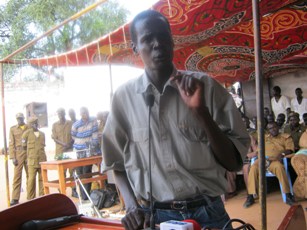Referendum entity gives Juba Prison $6,000, bail out 24 prisoners
September 30, 2010 (JUBA) — A total of 24 prisoners, each said to have been in detention over minor offences, yesterday gained their freedom from Juba Central Prison, courtesy of a SDG 15,000 (about $6,000) contribution from Greater Equatorial, Bahr el Ghazal and Upper Nile (GEBU) Referendum.

Majority of those who breathe yesterday’s sigh of relief were prisoner implicated in petty thefts cases, violent fights, anti-social behaviors, among other minor offences. One of the released youth, said he plans to return to school and attain basic education.
“I am now a reformed man. This place [the prison] has taught me how to behave in a community that has many people with different back grounds. I also want to thank JEBU Referendum for their generous contribution towards us,” the visibly excited lad, only identified as John told Sudan Tribune from Juba Central Prison.
In his remarks, JEBU Referendum Director, James Taban Dakada said, “Civic education remains an important element in creating awareness among the people in communities. We have decided to bail these prisoners so that they can benefit from the civic education JEBU Referendum is carrying out in payams and bomas in South Sudan”.
According to Taban, much as the organization has plans to extend similar services to prisons located in the other states of the region; they still face numerous challenges, citing logistical problems, poor roads and widespread concerns raised by community members on the delayed referendum processes.
On his part, however, Peter Atem, GEBU Referendum Chairperson, challenged leaders in South Sudan to come out openly and join the campaign to sensitize the population on why Southerners should opt for separation, saying unity has ceased to be an attracted option.
Preparations for the referendum, he reiterated, remains behind schedule and that all stakeholders should work together in the struggle to realize a free, fair and transparent southern Sudan referendum.
The long-awaited referendum, already earmarked for early next year, remains a key requirement of the 2005 Comprehensive Peace Agreement (CPA); the accord that brokered a peace deal between former rebels in the south and the Arab-dominated north.
To-date, however, the civic voter’s registration across the semi-autonomous region has not yet even started, while the state referendum committees, entities established by the South Sudan Referendum Bureau (SSRB) still lack offices, coupled with lack of staff appointments.
Central Equatoria State (CES) Deputy Governor, Manase Lomole, South Sudan Prison Service’s Alfred Manyang, representatives from the Ministry of Legal Affairs and Constitutional Development (MoLACD), Southern Sudan Human Rights Commission (SSHRC), Sudan People’s Liberation Movement (SPLM), government, among others.
(ST)
